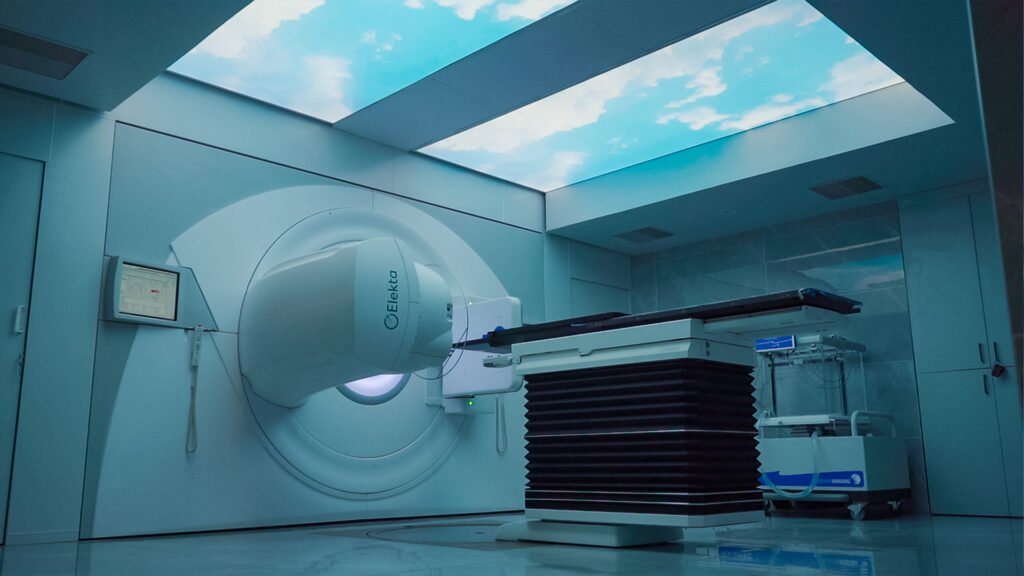
Radiation Oncology
Our highly skilled team of radiation oncologists, medical physicists, and radiation therapists work together to deliver personalized treatment plans aimed at targeting and treating cancer while minimizing the impact on healthy tissues.
- We prioritize the well-being and comfort of our patients throughout their treatment journey. Our team takes the time to listen to your concerns and provide comprehensive support.
- We utilize advanced technology, such as image-guided radiation therapy (IGRT), intensity-modulated radiation therapy (IMRT), and stereotactic radiosurgery (SRS), to deliver highly precise treatments tailored to your specific cancer type and stage.
Overview
Radiation Oncology is a specialized medical field focused on the treatment of cancer using high-energy radiation. This therapeutic approach is designed to target and destroy cancer cells while minimizing damage to surrounding healthy tissue. Radiation therapy can be used as a primary treatment modality or in combination with surgery, chemotherapy, or immunotherapy to enhance cancer treatment outcomes. It employs advanced technology, such as linear accelerators and precision-guided techniques, to deliver highly targeted radiation doses to tumors. The goal of Radiation Oncology is to provide effective cancer treatment while ensuring patients’ quality of life and overall well-being.
Through the use of advanced technology and specialized expertise, radiation oncologists create individualized treatment plans to effectively target cancer cells, leading to improved chances of cure or symptom relief. This field constantly evolves with innovations like image-guided radiation therapy (IGRT) and stereotactic radiosurgery (SRS), offering patients cutting-edge options. Multidisciplinary collaboration is key, as radiation oncologists work in tandem with other specialists to provide integrated cancer care. The ultimate aim is to enhance patients’ quality of life and contribute to their successful cancer management.
Symptoms & Diagnosis
Symptoms are the body’s way of communicating that something is amiss. They are observable and felt indicators of changes in one’s physical or mental well-being. Symptoms can vary widely, from subtle discomfort to more pronounced distress, and they play a crucial role in diagnosing and addressing health issues. Here’s an overview of symptoms of “Pain, Fever, Fatigue, Nausea and Vomiting, Cough, Shortness of Breath, Swelling, Rash, Headache, Weakness, Changes in Vision or Hearing, Changes in Bowel Habits“. Recognizing and understanding symptoms is crucial for seeking timely medical attention and addressing underlying health concerns. Symptoms serve as valuable clues, helping healthcare professionals make accurate diagnoses and develop appropriate treatment plans.
Diagnosis is the cornerstone of modern medicine, serving as the process through which healthcare professionals identify, understand, and define a patient’s medical condition or illness. It is a pivotal step toward effective treatment and care. Here’s a comprehensive overview of diagnosis “Identification of the Condition, Exploration of the Underlying Cause, Assessment of Severity, Treatment Planning, Prognosis, Monitoring and Follow-up, Multidisciplinary Collaboration”. Accurate and timely diagnosis is essential for providing effective medical care and improving patient outcomes. It represents the bridge between recognizing health issues and implementing appropriate solutions to address them, ensuring that individuals can lead healthier, more fulfilling lives.
- CT Simulation
- MRI (Magnetic Resonance Imaging)
- PET-CT (Positron Emission Tomography-Computed Tomography)
- 3D Conformal Radiation Therapy (3D-CRT)
- Intensity-Modulated Radiation Therapy (IMRT)
- Stereotactic Radiosurgery (SRS) and Stereotactic Body Radiation Therapy (SBRT)
- Image-Guided Radiation Therapy (IGRT)
Meet Our Doctors
Our administration and support staff all have exceptional people skills and trained to assist you with all medical enquiries. Doctors will be available from 8 am : 12 am , kindly call to confirm your Appointment.
Emergency Cases
Please feel welcome to contact our friendly reception staff with any general or medical enquiry call us.




